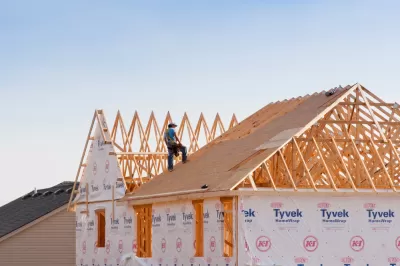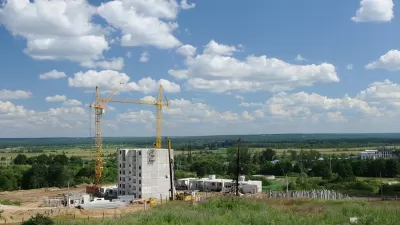Are housing and housing finance two separate problems? California Assemblymember David Chiu and others in housing discuss how available finance tools could be employed to expand the capital pool for affordable housing projects.

California cities, especially coastal cities, continue to struggle to meet market calls for more homeless, low and moderately priced housing to meet unmet demand. Lack of adequate financial incentives that support various types of development demanded throughout the state contribute to the supply crisis. In The Planning Report, state leaders discuss what they can do to incentivize more housing development at the local level, and how available finance tools could be employed to expand the capital pool for affordable housing projects.
California Assemblymember David Chiu, the Chair of the Housing and Community Development Committee and author of numerous housing and transit-oriented development bills in the California legislature over the past three sessions, spoke about the need of creating more funding to build the affordable housing needed in California. He stated, "we need to think about traditional answers, like expanding the affordable housing tax credit and bringing back some version of redevelopment, but we also need to think innovatively. I’ve proposed that we think about the billions of dollars we are currently spending on the mortgage interest deduction—and whether that’s the best use of money, or whether we could use that money to build affordable housing. I’ve also proposed exempting property taxes for developers that build missing middle housing."
Asm. Chiu also noted the decreased support of the federal government in financing and maintaining affordable projects. Chiu remarked that "HUD is cutting billions of dollars of resources to states like California," and that the changes to tax policy are "gutting [California's] ability to use affordable housing tax credit tools. Last year, the legislature had a major breakthrough with a package of bills that I see as an initial down payment on solving this problem. But down payments solve 20 percent of your problem."
When asked about how lawmakers in California plan to address the issue in 2019 and beyond, Asm. Chiu supported "a significant expansion of the Low-Income Housing Tax Credit" and "bringing back Redevelopment 2.0." Chiu remarked that "tax-increment financing worked, particularly when it came to housing and infrastructure."
The piece also features remarks from Beth Ruyak of Capital Public Radio, Vice Mayor Steve Hansen from the City of Sacramento, YIMBY Action Director Laura Foote Clark, Genetech's Carla Boragno, Related California's Bill Witte.
Read more in The Planning Report.
FULL STORY: Milken California Policy Summit Asks: Will Innovative Financing Solve California's Housing Shortage?

Study: Maui’s Plan to Convert Vacation Rentals to Long-Term Housing Could Cause Nearly $1 Billion Economic Loss
The plan would reduce visitor accommodation by 25,% resulting in 1,900 jobs lost.

Alabama: Trump Terminates Settlements for Black Communities Harmed By Raw Sewage
Trump deemed the landmark civil rights agreement “illegal DEI and environmental justice policy.”

Why Should We Subsidize Public Transportation?
Many public transit agencies face financial stress due to rising costs, declining fare revenue, and declining subsidies. Transit advocates must provide a strong business case for increasing public transit funding.

Paris Bike Boom Leads to Steep Drop in Air Pollution
The French city’s air quality has improved dramatically in the past 20 years, coinciding with a growth in cycling.

Why Housing Costs More to Build in California Than in Texas
Hard costs like labor and materials combined with ‘soft’ costs such as permitting make building in the San Francisco Bay Area almost three times as costly as in Texas cities.

San Diego County Sees a Rise in Urban Coyotes
San Diego County experiences a rise in urban coyotes, as sightings become prevalent throughout its urban neighbourhoods and surrounding areas.
Urban Design for Planners 1: Software Tools
This six-course series explores essential urban design concepts using open source software and equips planners with the tools they need to participate fully in the urban design process.
Planning for Universal Design
Learn the tools for implementing Universal Design in planning regulations.
Smith Gee Studio
Alamo Area Metropolitan Planning Organization
City of Santa Clarita
Institute for Housing and Urban Development Studies (IHS)
City of Grandview
Harvard GSD Executive Education
Toledo-Lucas County Plan Commissions
Salt Lake City
NYU Wagner Graduate School of Public Service





























